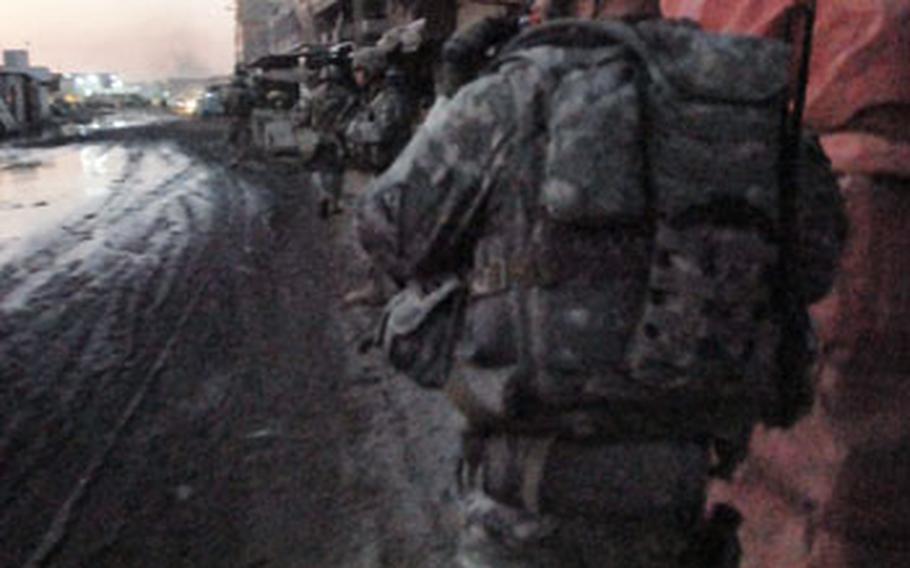
Staff Sgt. Christopher Dyer, a platoon sergeant with Company A, 1st Battalion, 6th Infantry Regiment, walks through the Jamilla market during a patrol Saturday night. The market was the scene of heavy fighting until soldiers built a wall that limited the movement of Mahdi Army members. (Photos by James Warden/Stars and Stripes)
BAGHDAD — A person could be forgiven if his or her eyes start to glaze over when they hear about the Jamilla market improvements. The Army has dozens, perhaps hundreds, of market-improvement projects across Iraq — all important, all similar.
Walk around Jamilla, though, and you get a sense of what makes Baghdad’s largest market especially crucial. Tractor-trailers can back into most Jamilla stalls, whereas at other markets vendors have man-sized kiosks. Bags of rice, flour and other foods imported from Syria and Iran are stacked two stories high. When Jamilla has problems, prices go up everywhere in Baghdad.
"Most of the businesses here are not retail, but wholesale," said Staff Sgt. Christopher Dyer, a platoon sergeant with Company A, 1st Battalion, 6th Infantry Regiment. "All the fruit, soda, chips — everything — comes right through here."
Jamilla’s location is most important. The market sits squarely in the Shiite slum of Sadr City. With the influence of Sunni extremists like al-Qaida waning, Baghdad’s Sadr City district is perhaps key to the future of Iraq’s security.
That point was reinforced Friday when insurgents launched a failed roadside bomb attack on an American convoy in Jamilla. The area had gone a few months without an attack, which most units would consider a success.
But soldiers have been told that high-level leaders consider Jamilla a bellwether for the rest of the country, so the attack brought a swift crackdown. Platoons spent as much as nine hours immediately afterward searching more than 100 buildings for evidence of the bomber. Iraqi units starting after them continued the search until midnight. The Americans continued searching Saturday and flooded Jamilla’s streets with 24-hour coverage Sunday — an increase over the already heavy Iraqi and American presence here.
"We’re up there all the time trying to keep that under control," said Maj. Travis Thompson, the 1/6 operations officer.
Jamilla’s stability is relatively recent. Muqtada al-Sadr’s Mahdi Army once controlled the market through extortion, said 1st Lt. Gordon Bostick, a Company A platoon leader. Vendors had to pay off the extremist group or risk having their homes destroyed and themselves killed. The extortion is thought to have brought in about $70,000 a month that enemy fighters could use to buy weapons.
The Americans began to change that in May when they built a wall to separate the southern third of Sadr City, including Jamilla, from the rest of the district.
Mahdi Army fighters fought the construction desperately because they knew it would make it harder for them to move about Baghdad and find sanctuary after launching indirect fire attacks on the International Zone, a continuing concern as President Bush visited on Sunday.
"We had a pretty solid 12-hour firefight one day," Dyer recalled.
Jamilla’s streets still bear the scars of that fighting. Walking down a Jamilla street, Dyer pointed to a charred cinderblock building directly across from an Iraqi army compound where the Americans went to rest while building the wall. Mahdi Army members could fire from the building into the compound, but the building’s recesses made it hard for anyone to return fire. Eventually, the Americans called in a Hellfire missile attack from an Apache.
The wall worked, though, and the Americans and Iraqi government quickly spent millions to repair the neglect suffered by the area ever since Saddam Hussein’s Sunni regime built Sadr City to house the restive Shiite poor, Thompson said.
Soldiers offered microgrants to local businesses. The government paved many of the market roads. Streets where people made a living ferrying residents across feces-filled water could be traveled on foot again.
The government’s open-handedness helped drive a wedge between the people and an extremist group whose extortion belied its claims to protect the people, Bostick said. Within a month after the wall was built, word had spread that Jamilla was safe for business, Dyer said.
The market has since returned to its bustling ways, sans extortion. Hussein Gams, who was loading fruit crates onto a truck Saturday, gave the American and Iraqi armies full credit for that.
"Thank you very much for making it safe," he told the soldiers.
Friday’s failed attack has soldiers working overtime to ensure that peace holds. But key events on the horizon, like provincial elections and the implementation of Iraq’s security framework agreement, are likely to buffet Jamilla with forces beyond its borders.
Iraqis in the market Saturday evening were unconcerned about the violence, though. They shrugged off American worries and continued with the profitable — and peaceful — business at hand.
Khalil Ibrahim is a truck driver who delivered goods to Jamilla during its dark days. Saturday found him heating dinner with fellow drivers outside a semi parked at a Jamilla truck park where insurgents once launched rocket attacks.
"This time, it’s better," he said with a smile. "It’s very good. This time, I can sleep in my truck."
Photos by James Warden/Stars and Stripes
Iraqi army Cpl. Abbas Kadim waits outside of a building used to store juice during a search of a factory neighborhood near Sadr City’s Jamilla market on Saturday. The district has many machine shops that soldiers searched for roadside bomb components following a failed attack on an American convoy the day before.